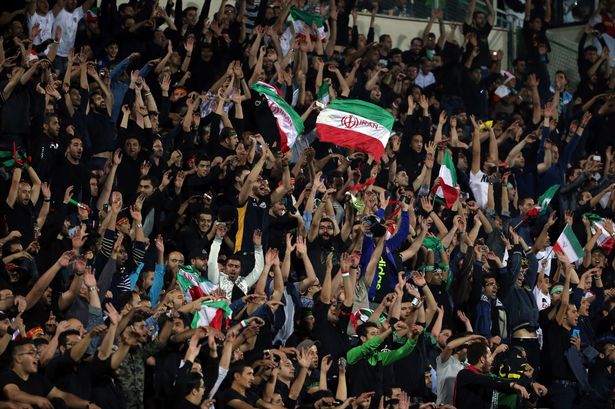October 14, 2016

The Iranian national soccer team won both of its World Cup matches this past week, propelling Iran to the top of the standings for its group.
Iran defeated Uzbekistan 1-0 in Uzbekistan last Thursday and then defeated South Korea, also by a 1-0 score, Tuesday at Tehran’s Azadi Stadium.
The single goal against Uzbekistan was scored by Jalal Hossaini in the 27th minute, and the single goal against South Korea was scored by Sardar Azmoun in the 25th minute.
Coach Carlos Queiroz played expat star Reza Ghoochand-nejad for most of the game against Uzbekistan, but never put him on the field against South Korea.
Iran has now played Uzbekistan 10 times over the years, winning five of those matches, losing four and drawing one. Iran has played Japan 33 times, winning 15 games, losing 12 and drawing six.
Tuesday’s game was played on Tasua, one of the great mourning holidays on the Shiite calendar. It appears no one noticed that until a few weeks ago.
Iran then asked that the game be played a day earlier. IranWire said FIFA, the governing body of international soccer, approved the request if South Korea would assent, but the Koreans objected to any change. They said all their travel arrangements had already been made. And they pointed out that the schedule was laid down four years ago with no compliant from Iran.
Fifty-six Majlis deputies wrote a letter to the Sports Ministry telling it to change the date, ignoring the fact that it didn’t have that authority.
All this produced a lot of angry clerics, with some suggesting Iran should refuse to play, which would have awarded South Korea a victory by a score of 3-0.
A compromise was finally reached with the stadium draped in black flags of mourning and fans urged not to cheer and applaud the Iranian team but instead use the religious chant, “Ya, Hossain.” Fans were also asked to attend wearing black mourning clothing and the vast majority of the 76,000 fans in the stands did so.
At half time, singers performed religious dirges on the field.
With two wins this past week, Iran took over first place in Group A with 10 points. Most noteworthy, Iran is the only team of the 12 in the competition that has not given up a single goal in four games.
Also worthy of note, China is at the bottom of the standings in Iran’s group, having one draw and three losses. It is most likely headed for elimination.
In the other group, Thailand is the whipping boy, having lost all four of its matches, giving up 10 goals and only scoring one goal.
For those with a political mind, Saudi Arabia heads Group B, staring at Iran across the gulf between the two groups.
In the hassle over Tasua, Ayatollah Mohammad Yazdi, the head of the Society of Seminary Teachers in Qom and once the chairman of Iran’s Judicial Branch, urged a cancellation because it could send fans into joyous celebration at a time that demands solemnity.
“Any harm coming from the cancellation of the game will be offset by the benefit that comes from respecting Ashura,” Yazdi was quoted as saying October 2.
Speaking at Friday Prayers in the capital last week, Ayatollah Mohammad-Ali Movahedi-Kermani approved the match being played on Tasua, but laid down guidelines to ensure that it did not contradict Ashura.
“The atmosphere of the match should be 100 percent Ashura and Karbala, the walls should be draped in black, the whole space should be covered in black, and there should be continuous ‘Ya Hossain’ chants from the crowd,” Movahedi-Kermani told worshipers, a reference to the Arabic phrase that is used to invoke the memory of Hossain.
A deputy sports minister said all the “values of Muharram” would be enforced during the match. Abdol-Hamid Ahmadi said religious orators and mourning bands would be in the stadium three hours before the game. “Cultural items, including shawls and headbands imprinted with the name of Imam Hossain,” also were to be distributed to fans at the stadium, he said.
The Mirror of London reported that Iran’s embassy in Seoul asked that Korean fans at the match avoid wearing bright colors. But South Korea’s alternate uniforms are red, the color identified with Shimr ibn Thil-Jawshan, the man who beheaded Imam Hossain.
